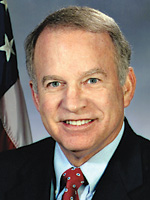Gary E. Payton
Former Deputy Under Secretary of the Air Force and Astronaut
MSAAE 1972
In recognition of his technical and managerial leadership in space exploration and development
Growing up in the 1950s, Gary Payton had no idea he would someday travel to space. He was just your average boy interested in trucks, cars and airplanes – with one exception. He had an appetite for reading that far exceeded most of his peers.
“My mom took me to the library every Saturday, and I’d check out four books and consume them over the course of the week,” says the Rock Island, Ill., native. “By the time I was in 7th or 8th grade, I had read everything the library owned related to airplanes, rockets and satellites.”
The love of all things aerospace helped propel Payton through the U.S. Air Force Academy, Purdue University and a career focused on aviation and space flight – a career that would include a spot on the space shuttle Discovery (STS-51C) in 1985.
STS-51C was the first mission dedicated to the Department of Defense. Payton, a major in the Air Force at the time, was selected as payload specialist. By the time Discovery touched down at Kennedy Space Center, Payton had traveled over 1.2 million miles and logged more than 73 hours in space.
What was the experience like? “Very humbling,” Payton says. “You’re this little human outpost orbiting this big blue marble. You feel immensely tiny compared to the Milky Way. You feel humbled by the beauty of the Earth and the magnitude of the universe.”
Payton retired from active duty in 1995 and went on to high-level positions in the aerospace industry, mostly in the civil service but including two years as a senior vice president at ORBIMAGE, a leading global provider of Earth imagery products and services. When he retired in 2010, he was deputy under secretary of the Air Force for space programs, where for five years he maintained the perfect launch record for national security space missions that had begun in 1999.
“A launch vehicle and the satellite mounted on top of it can cost over a billion dollars, so a launch failure is very expensive, and it jeopardizes the health of a constellation of satellites,” says Payton. “So I constantly reminded everyone about the importance of reliability. I was willing to tolerate a delayed launch as long as reliability increased.”
While Payton’s time as an astronaut has enabled him to see things most people can only dream of, it’s interesting to note that the thing he’s most proud of looking back on his life is a nearly universal experience.
“There’s nothing that compares to seeing your daughter being born,” he says. His daughter is now fully grown with children of her own, and Payton is looking forward to spending a lot more time with his family in retirement.
Career Highlights
| 2005-2010 | Deputy Under Secretary of the Air Force for Space Programs |
|---|---|
| 2002-2005 | Deputy for Advanced Systems, Missile Defense Agency |
| 2000-2002 | Senior Vice President, Engineering and Operations, ORBIMAGE |
| 1995-2000 | Deputy Associate Administrator for Space Launch Technology, NASA |
| 1992-1994 | Deputy for Technology, Ballistic Missile Defense Organization |
| 1986-1990 | Assistant Deputy for Technology and Executive Officer to the Director, Strategic Defense Initiative Organization |
| 1985-1986 | Payload Specialist, Space Shuttle Discovery (STS-51C) |
| 1980-1984 | Pilot and Engineer, Spacecraft System Program Office, U.S. Air Force |
| 1976-1980 | Spacecraft Launch Director, Cape Canaveral Air Force Station |
| 1972-1976 | Pilot and Instructor Pilot, U.S. Air Force |
| 1972 | MSAAE, Purdue University |
| 1971 | BSAE, U.S. Air Force Academy |

